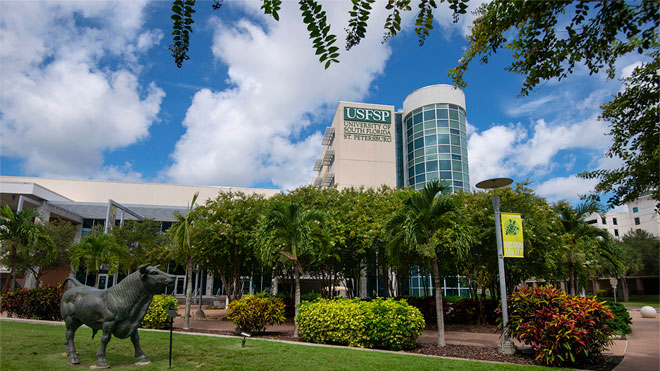Nutrients and Red Tide in Florida: State of the Science Symposium
Florida Sea Grant (FSG) and The University of Florida’s Institute of Food and Agricultural Sciences (UF/IFAS) are pleased to convene a Nutrients and Red Tide in Florida: State of the Science Symposium. With funding by Florida Fish and Wildlife Conservation Commission’s (FWC) Fish and Wildlife Research Institute’s Harmful Algal Bloom Grant Program and at the request of the Harmful Algal Bloom (HAB) Task Force, this 2.5 day symposium will occur April 21-23, 2025, at the University of South Florida, St. Petersburg campus. Day one of the Symposium will begin at 1:00 pm to allow participants to travel after the Easter Holiday.
Symposium Topics
- Nutrient Dynamics across Bloom Stages
- Tracking Nutrients through Systems
- Management and Response
The purpose of this invitation-only symposium is to assess the current state of knowledge, to share updates on new findings and ongoing efforts, and to guide future management and research priorities addressing nutrients and red tide.
Objectives:
- Encourage interdisciplinary collaboration and dialogue
- Synthesize the current state of knowledge and efforts and identify gaps regarding the role and contribution of nutrients in red tide events
- Identify and prioritize short- and long-term research needs and strategies
- Identify connections to local, regional, and state management policy interventions
A symposium white paper will be developed with the information generated during the 2.5-day symposium. The white paper will be used to inform Florida’s Harmful Algal Bloom Task Force and guide the state’s Harmful Algal Bloom Grant Program. The symposium will also be a great opportunity for networking within the Karenia brevis red tide professional community.
Symposium Team
Chair – Lisa Krimsky, UF/IFAS and Florida Sea Grant
Co-Chair – Betty Staugler, Florida Sea Grant
Facilitator – Joy Hazell, UF/IFAS and Florida Sea Grant
Steering Committee (SC) & Technical Advisory Committee (TAC) Members
Meghan Abbott, FWC-Fish & Wildlife Research Institute (SC)
Kristen Buck, Oregon State University & University of South Florida (SC)
Yesenia Escribano, Florida Department of Agriculture and Consumer Services (SC)
Emily Hall, Mote Marine Laboratory (SC)
Katherine Hubbard, FWC-Fish & Wildlife Research Institute (TAC)
Nicole Iadevaia, Coastal & Heartland National Estuary Program (SC)
Angela Knapp, Texas A & M University (TAC)
Yonggang Liu, University of South Florida (TAC)
Michael Parsons, Florida Gulf Coast University (TAC)
Mark Rains, Florida Department of Environmental Protection (FDEP)
Ed Sherwood, Tampa Bay Estuary Program (SC & TAC)
Rhonda Watkins, Collier County (SC)
David Whiting, Florida Department of Environmental Protection (SC)
Agenda
Monday, April 21st
1:00 pm | Welcome & Introductions
Session 1: Nutrient Dynamics across Bloom Stages
- A Historical Synthesis Presentation
- A Contemporary Synthesis Presentation
- Lightning Talks
- Q & A
- Whole Group Facilitated Discussion
5:00 pm | Adjourn
Tuesday, April 22nd
8:00 am | Breakfast
9:00 am | Session 1 continued: Nutrient Dynamics across Bloom Stages
- Identify Research Priorities
Session 2: Tracking Nutrients through Systems
- Synthesis Presentation
- Lightning Talks
- Q & A
- Whole Group Facilitated Discussion
- Identify Research Priorities
5:00 pm | Adjourn
Wednesday, April 23rd
8:00 am | Breakfast
9:00 am | Monitoring, data, and technologies
Session 3: Management and Response
- Synthesis Presentations
- Lightning Talks
- Q & A
- Facilitated Whole Group Discussion
Prioritize Research Needs
Identify Next Steps
5:00 pm | Wrap up and Adjourn
